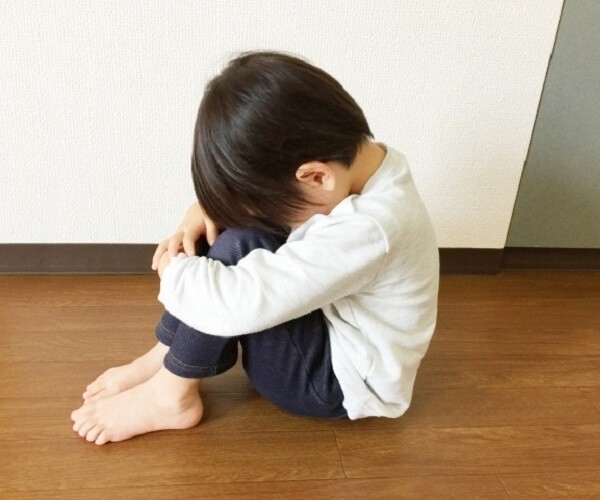Children often feel responsible for their parents’ arguments and disagreements, even though this is not the case. Children may blame themselves and feel guilty, which can affect their psychological development.
Experts have listed eight common fears in children, and by understanding these, parents can find more positive ways to raise their children.


Parents Arguing
A children’s psychological research institute in China once conducted a psychological survey with over 3,000 school-aged children.
One of the questions was, “What do you fear the most about your parents?” The most common answer was, “I fear my parents arguing.”
Disputes between parents can cause confusion and anxiety in children. Children often do not understand the reasons for these conflicts and feel insecure and scared.
Children may think that these arguments could lead to family breakdown, making them feel lonely and insecure.
One child shared, “I fear when my father gets angry; he looks very fierce when he’s mad,” or “When my mother shouts, my heart races, and I can’t eat anymore…” These descriptions show the fear associated with the actions and emotions of the parents. Children feel helpless and unsure of how to help or defuse the situation.

Parents arguing.

Parents Losing Their Temper
Children are very sensitive to the emotions of others. Therefore, when parents lose their temper, it will undoubtedly affect the behavior and emotions of the children.
However, sometimes children do not understand why their parents are angry. In other words, they do not know what they have done wrong.
Therefore, parents should try to stay calm and, if they do lose their temper, explain the situation to the children afterward and show them that they care through their actions.
If possible, it is best for parents to give a warning before they lose their temper, such as:
“I’m getting angry. Can you hurry up, please…”
“I’m not in a good mood today; I’ll take a break, and you can play by yourself for a while.”

Favoritism: Not Giving Equal Love to All Children
Parental favoritism can cause feelings of jealousy in some children.
A large body of research has found that parental favoritism negatively affects children’s and adolescents’ mental health and behavior and even adults. Even when they grow up and live away from home for many years and start their own families, the impact persists.
Moreover, whether the favored child, the neglected one, or the one left out, just perceiving favoritism can be harmful. The neglected child will resent the parents, and the favored child will face resentment from their siblings.

Not giving equal love to all children.

Parents Breaking Promises and Lying
Some parents make conditional promises related to their children’s performance in school.
For example, “If you finish your homework quickly, I’ll let you watch TV all day.” However, after the child finishes their homework, the parents may ask them to do additional chores.
Or, parents may promise a reward if the child gets good grades but then fail to deliver on that promise. As a result, many children grow up distrusting promises.
When parents break their word, they erode trust and credibility, negatively impacting their children’s development and perception.
Before making a promise to a child, parents should consider the following three things:
– Do not make promises to children lightly or casually.
– Do not hastily agree to a child’s demands to achieve short-term goals.
– When a child makes a request, think carefully about whether it is reasonable and achievable. If it is, make a sincere commitment and keep your word.

Not Being Friendly with Your Child’s Friends
If parents constantly express disapproval of their children’s friends, it will create resentment and widen the gap between them. Children will feel controlled and lose their autonomy in life.
Parents should respect their children’s choice of friends from the children’s perspective. When children can make friends with those they feel comfortable with and get along with, they will learn how to communicate, cooperate, and build healthy relationships.
A child’s ability to make good friends is one of the most fundamental relationships in human interaction.
Friendships provide children with a sense of belonging and offer valuable lessons about friendship and sharing. Positive experiences in these relationships help children develop essential social skills and values, forming the foundation for their future development.

Not being friendly with your child’s friends.

Comparing Your Child to Others
Many parents unconsciously compare their children’s weaknesses to others’ strengths, even exaggerating others’ qualities. Although they want to set a good example for their children, they end up causing harm.
Every child has unique strengths and talents. Whether they learn quickly or slowly or have high or low academic performance, evaluating their qualities should not depend on a single aspect.
Always believe in your child’s ability to excel, offer praise, and provide motivation for self-improvement.

Accusing Your Child in Front of Guests
When family and friends gather, talking about children often becomes an essential topic.
Many parents like to expose their children’s weaknesses in front of others. However, this can make children feel inferior and unappreciated, such as when they are criticized for their academic performance, appearance, or social skills.
Over time, children may feel that their parents are dissatisfied with them and gradually distance themselves.

Many parents like to expose their children’s weaknesses in front of others.

Lack of Patience in Answering Your Child’s Questions
Curiosity is inherent in human nature, especially during childhood.
In this phase, children often ask a series of questions about the world around them, ranging from simple queries like, “Why is the sky blue?” to more complex ones such as, “What do adults do at work?” This curiosity is a sign of intelligence and a driving force for exploration. However, parents often fail to recognize the importance of these inquiries.
Some parents dismiss their children’s questions with indifferent responses such as, “Don’t ask too many questions,” or “Just do as I say.” This reaction discourages children from asking questions and diminishes their motivation to explore and learn.
When children feel that their inquiries are not valued, they may stop asking questions and lose their curiosity.

































